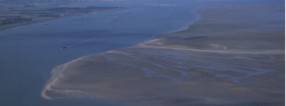
ecological characterization of
European estuaries,
with emphasis on the Scheldt estuary
|
|||
| |
 |
Scientific Research Community on ecological characterization of European estuaries, with emphasis on the Scheldt estuary |
|
| home | objectives | activities | databases | partners |
| >> A scientific community |
   |
 Estuaries are heterogenous and dynamic systems that contain specific life communities. Too often however, they suffer from human impact. The complexity of estuarine systems, in particular the Scheldt estuary, demands a multidisciplinary research approach. The differentiation of the financial sources enhances fragmentation of research activities. This is the reason why in 2002 a scientific research community was founded, financed by the Fund for scientific research - Flanders. The aim of this scientific community is to improve integration of estuarine research, hereby supported by international scientific feedback concerning research on the Seine estuary.  |
|
Being the transitional zone between land and sea, estuaries are dynamic and heterogeneous systems that harbour very specific communities. At the same time estuaries are under a lot of human pressure like pollution, eutrophication and morphological changes caused by expansion of harbours or by the long history of polder creation. Estuaries often function as filters for a high load of nutrients and polluting substances. The research conducted by the scientific community on ecological characterization of European estuaries focuses on the key factors determining the ecological functioning of the Scheldt estuary: hydraulics, morphology, sedimentology, carbon cycling, biogeochemistry of nutrients and pollutants, food web structure and biodiversity of estuarine communities. The interactions between these factors are complex. Despite the amount of knowledge that has already been gathered, some remarkable gaps still remain. Within this scientific community the aim is to consolidate the coordination of the multidisciplinary approach of these interactions. Furthermore it is interesting to compare the knowledge that is being developed on the Scheldt estuary with the current knowledge on the Seine estuary. Both estuaries suffer analogue problems and show a lot of similarities in the composition of the system, but each of them also has its own specific situation. Undoubtedly estuarine research on the Scheldt estuary will benefit from the advanced know how on integrating estuarine research that exists for the Seine estuary. |
| Supported by Fund for scientific research - Flanders (Belgium) |
General coordination: Patrick Meire, Stefan Van Damme Web site and databases hosted by VLIZ Webmaster Klaas Deneudt |